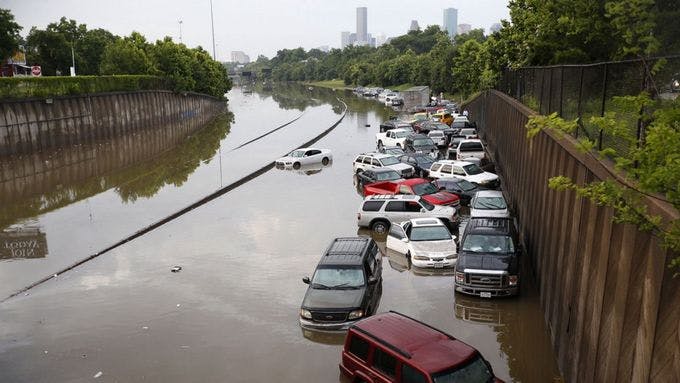Trying To Reason With Hurricane Season
Houston is drowning but there are storm clouds on the Washington horizon
by Chris Thomas

Hurricane Harvey is a perfect storm. The stalled-out Category 4 has dumped more than 20 trillion gallons of water — nearly four times the flow of the Mississippi river — on Southeast Texas which, between its physical and soil geography, is one of the least suitable areas in the country for dispersing that water. Flooding is bad and getting worse.
But while the residents of Houston are trying to save themselves, their families, and what’s left of their homes, in Washington the political fallout from the storm is impossible to ignore.
Trump’s Katrina
President Trump’s political enemies have been watching the White House’s response to Harvey closely; any misstep by the administration would certainly invite comparisons to President George W. Bush’s handling of Hurricane Katrina. But by all accounts the Federal response has been competent so far. While Trump tempted fate by praising FEMA Administrator Brock Long for “doing a great job” (shades of “heckuva job, Brownie”) the reception in Texas has been positive. “Texas Gov. Greg Abbott loaded heavy praise on Trump and the federal government, describing an “A-plus” effort.” Nonetheless, the cleanup and recovery from Harvey is far from over and the success or failure of the White House to respond may well be judged in terms of its ability to mobilize funds for the cash-strapped Federal Emergency Management Agency.
A Budgetary Monkey-Wrench
In fact, there is only about $3.3 billion dollars in the FEMA disaster relief fund, a paltry sum when it comes to the massive scale of damage wrought by a storm like Harvey. But with the debt-ceiling debate closing in, every billion counts and the allocation of funds to help out the waterlogged citizens of Houston will likely move the deadline for a debt-limit extension. Congress may choose to double-down on the issue and tie the debt-ceiling bill to hurricane relief funding. Such a plan would likely quell the budget hawks, especially the ones from Texas, but creates a “must pass” bill with all of the political risks such legislation entails.
Climate Change
One risk of floating a “must-pass” bill may be from Democrats insisting that climate change be addressed in it. When meteorologists say that Harvey is the third 500-year flood to hit the Houston area they mean that a flood like that caused by Harvey should have about a one-in-five-hundred chance of happening in a given year. While it is impossible to say that any given weather event happened “because of climate change” climate-scientists agree that climate change makes extreme weather more likely and more extreme. Harvey will drop as much as five feet of rain on Houston by the end of August. While Harvey itself may not be a consequence of global warming, its severity may be and the issue of Climate Change will almost certainly come back to the forefront as Washington grapples with the enormity of this storm and the damage it has caused.
Government Waste
One of the reasons Hurricane Harvey has caused so much damage is that Houston is heavily built up in flood-prone areas. Nearly all buildings in flood zones are required — either by law or as a condition of a mortgage — to carry flood insurance but the federal government has long subsidized the cost of that insurance. A 1998 National Wildlife Federation report entitled Higher Ground found that development and redevelopment in flood prone areas was costing the federal government a lot of money and encouraging dangerous development decisions. While storms are natural events, floods are man-made and could be avoided with more risk-averse city planning.
The Comeuppance Caucus
Of course, even the best-planned cities with minimal hurricane risk will eventually run out of luck. When Hurricane Sandy slammed into New York in 2012, President Obama promised more than $60,000,000,000 in emergency funds to bankroll recovery efforts. The bill was assumed to be an easy pass, enjoying Republican and Democratic support. But a caucus of conservatives lead by Senator Ted Cruz (R-TX) opposed the funding. The bill eventually passed in a bipartisan effort lead by John Boehner and Nancy Pelosi but seventy-six House members opposed it, including 20 Texas Representatives who will return to the House to beg for assistance for their state at the end of the August recess.
Tell Congress what you think!
Text RESIST to 50409 to tell your representatives or Senators what you think about this or any other issue before Congress. With Congress in recess there may be townhalls in your area. Elite members of the Resistance can also text townhall to 50409 to be alerted of Congressional or Senatorial townhalls near them.
Support the ’bot!
Upgrade to premium for AI-writing, daily front pages, a custom keyword, and tons of features for members only. Or buy one-time coins to upgrade your deliveries to fax or postal mail, or to promote campaigns you care about!
Upgrade to PremiumBuy Coins